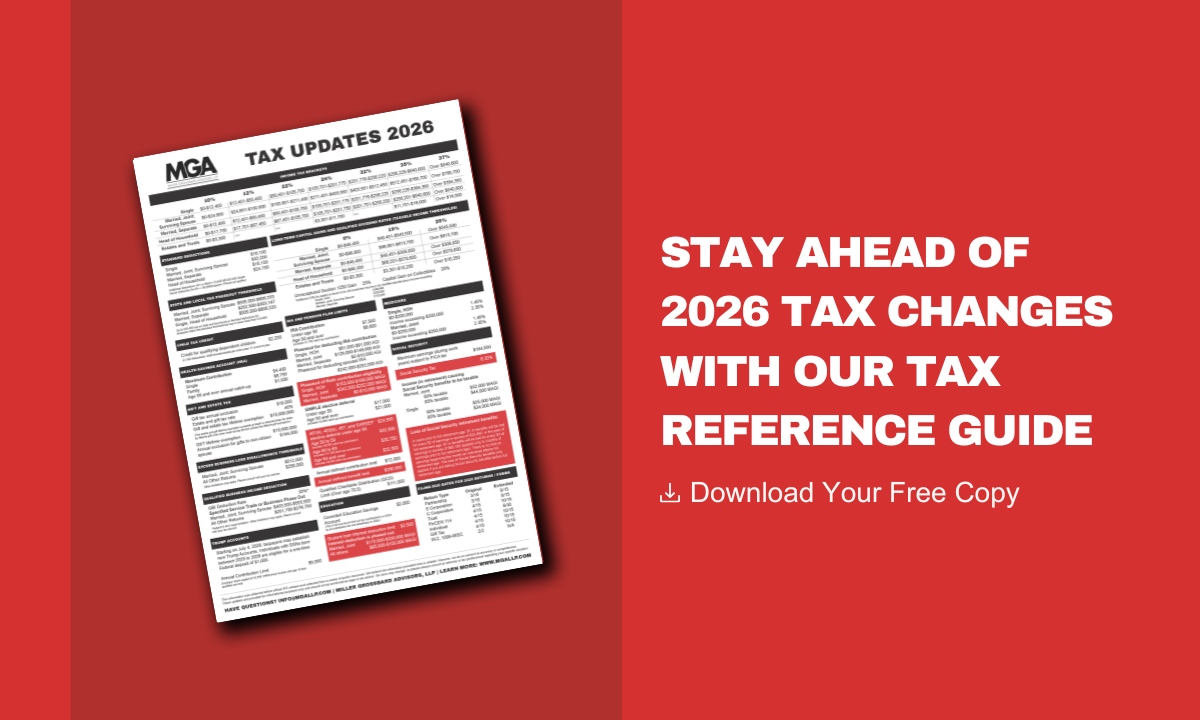On July 3, 2025, Congress passed the Senate’s version of the One Big Beautiful Bill Act (OBBBA), marking one of the most sweeping tax overhauls since the Tax Cuts and Jobs Act (TCJA) of 2017.
Beyond the headlines, this bill brings extensive pro-business provisions, new strategic tax planning opportunities, and significant policy changes that will directly impact business owners, high-income earners, and investors alike.
With so many provisions packed into this bill, here are the most impactful changes business owners and high-income taxpayers should understand and how they could shape your planning in 2025 and beyond.
9 Key Tax Changes in the One Big Beautiful Bill Act
1. 100% Bonus Depreciation Restore
Perhaps the biggest win for businesses is the restoration of 100% bonus depreciation. Effective for assets placed in service after January 19, 2025, this change repeals the previously scheduled phase-down and allows businesses to fully expense qualifying assets in the year of purchase.
Why it matters:
Businesses planning capital improvements, equipment upgrades, or property renovations can deduct the entire cost upfront, improving cash flow and incentivizing accelerated growth strategies. For real estate investors, this renews the full power of cost segregation studies to maximize depreciation deductions.
2. Immediate Expensing for Domestic R&D
The bill permanently reinstates the immediate deduction of domestic research and experimental expenses through new Section 174A. Companies can now elect to deduct or amortize R&D expenses incurred after 2024. In addition, eligible small businesses (average gross receipts of $31M or less) may retroactively apply this provision back to 2022, unlocking catch-up deductions.
Why it matters:
This is a powerful liquidity and tax planning tool for innovators, manufacturers, and technology firms, especially those with capitalized R&D from 2022–2024. Companies engaging in domestic research should evaluate amended return opportunities to recover prior amortized costs.
3. Section 179 Expensing Expanded
The bill raises the Section 179 expensing cap to $2.5 million, with the phaseout threshold increased to $4 million, both indexed for inflation starting in 2026.
Why it matters:
This benefits equipment-heavy operations and owner-operated businesses making capital purchases like machinery, vehicles, or leasehold improvements. Unlike bonus depreciation, Section 179 deductions can create flexibility in tax planning by allowing selective expensing.
4. Clean Energy Credits Terminated
A major funding mechanism of OBBBA is the termination or modification of IRA-era green energy credits, including:
- 179D (energy-efficient commercial buildings) and 45L (energy-efficient homes) — terminating after June 30, 2026.
- Clean vehicle credits, alternative fuel credits, and residential clean energy credits — generally ending after 2025.
Why it matters:
Real estate developers, energy companies, and investors with renewable initiatives should revisit project economics, timelines, and financing structures to ensure these incentives are captured before expiration.
5. Qualified Business Income (QBI) Deduction Made Permanent
The bill makes the Section 199A QBI deduction permanent, with expanded qualification criteria.
Why it matters:
Pass-through entity owners (S corps, partnerships, sole proprietors) gain long-term certainty in planning around this deduction, preserving substantial annual tax savings.
6. SALT Deduction Cap Increased (Limited Impact for Texas Residents on Income Tax, but Could Benefit Some with Larger Property Tax Deductions)
The controversial $10,000 SALT deduction cap increases to $40,000 starting in 2025, with a gradual 1% annual increase through 2029. However, for households with AGI over $500,000, the benefit phases out, restoring the lower cap for high earners.
Why it matters:
While this change has limited impact for most Texans, it could benefit clients with significant out-of-state income, those whose principal residence is in a state with income tax, or those with substantial property holdings and multi-state residency considerations. Reviewing your overall state tax exposure remains wise for optimal planning.
7. “No Tax on Tips” and Overtime Deduction Introduced
New deductions (rather than exclusions) for:
- Tips: Deduction up to $25,000 (phasing out for AGI over $150K single/$300K joint), effective through 2028.
- Overtime: Deduction up to $12,500 per year ($25,000 if filing jointly), with the deduction phased out for workers with modified adjusted gross income over $150,000 ($300,000 for joint filers); available through 2028.
Why it matters:
While these provisions primarily target middle-class relief, business owners in hospitality and service industries should understand implications for payroll reporting and employee retention strategies.
8. Estate Tax Updates
The estate tax exemption was set to revert to 2017 levels at the end of 2025, meaning individuals with more than roughly $7 million in assets would have been subject to estate tax in 2026. Under the new bill, the estate and gift tax exclusion is permanently increased to $15 million per taxpayer (indexed for inflation) for years beginning after December 31, 2025.
Why it matters:
Many clients had begun implementing strategies to prepare for a reduced estate tax exemption. With this permanent increase, couples with combined estates under approximately $30 million may no longer need complex estate tax structures. However, regular estate plan reviews remain essential to ensure your strategy aligns with your goals and current law.
9. Other Federal and International Tax Provisions
This summary addresses the most widely applicable tax provisions for our clients. However, the bill includes numerous additional federal and international tax changes that may impact your business and personal returns.
We will continue monitoring these provisions to keep you informed and ensure your tax planning strategies remain effective and up to date.
Looking Ahead: Planning Strategies for 2025 and Beyond
The One Big Beautiful Bill Act reorients federal tax policy towards domestic production, business investment, and select individual relief, while reversing major green energy initiatives. For business owners and high-net-worth individuals, this is a pivotal moment to:
- Reassess capital expenditure and depreciation strategies
- Evaluate R&D activity for retroactive and future deductions
- Revisit real estate and clean energy project timelines
At MGA, we are here to make the complex simple. We continuously monitor the evolving tax landscape and are here to guide you.
Have questions about the provisions outlined above or other parts of the bill that could impact your specific situation? Reach out to us today to begin planning.
.png?width=191&name=mgalogofinal-01%20(3).png)




